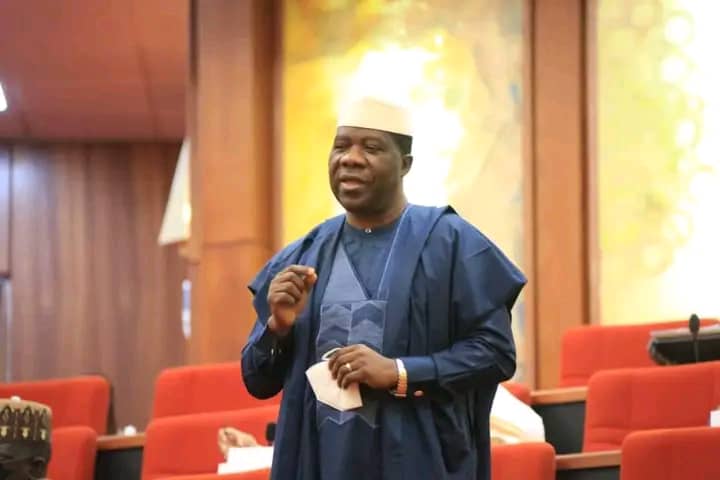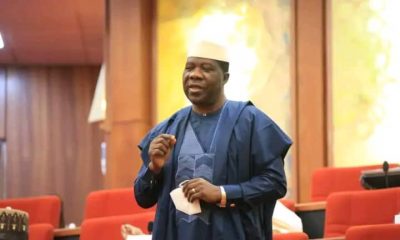News
FG approves N9.2bn premium for civil servants’ Life Insurance
Published
3 years agoon
By
News Editor
The Federal Executive Council (FEC) has approved the sum of N9.2billion as premium to insurance companies that will manage the group life insurance for federal civil servants in the country.
Minister of Information and Culture Lai Mohammed revealed this when he briefed State House correspondents on the outcome of the Council meeting which was presided over by President Muhammadu Buhari in Abuja on Wednesday.
He said: “On behalf of the Head of Civil Service of the Federation, I will like to report that council today approved the award of contract for the appointment of insurance companies for group life assurance for federal government employees, public servants, para-military and the intelligence community for the year 2021-2022 in the sum of N9, 248. 995, 907.
“This premium is for a period of 12 months.
“This is part of the government’s welfare programme for our public employees so that in case of death, they are assured that there would be compensation.”
The minister revealed that the council also approved N18.1billion for development of infrastructure and Kano and Calabar Free Trade Zones, as well as the Textile and Garment Park in Lagos and the Special Economic Zone, Lekki–Lagos.
Mohammed said the approval was of critical importance to the infrastructure development plan of the country.
The Minister of Finance, Budget and National Planning, Dr Zainab Ahmed, who also addressed the correspondents on the outcome of the FEC meeting, said she presented the first quarter of 2021 GDP results and other performance indicators of the Nigerian economy to the Council.
According to her, the estimates and report show that Nigerian GDP has grown to 0.51% year-on-year in real terms in the First Quarter of 2021.
The minister revealed that the agricultural sector posted a strong growth at the rate of 2.28 per cent in the first quarter of 2021, compared to previous quarters.
“Also, there is a further illustration that the slow, but gradual recovery process is indicative of the fact that business operations are returning to normal and that restrictions of movements and commercial activities have been relaxed after extended close-down in the year 2020.
“Also, the agricultural sector posted a strong growth at the rate of 2.28 per cent in the first quarter of 2021, compared to previous quarters. This growth in agriculture signifies the resilience of the agricultural sector.
“Also, the industry sector has recorded positive growth, even though a weak one, but the growth is a positive one and this marks the past quarter of growth over the past one year in the industry sector.
“Services recorded a slight dip, but a small one at 0.39 per cent.
“In addition to the economic activities and the reopening our businesses, growth was also boosted, in fact by increase in crude oil prices as well as increase in production in the first quarter of 2020.
“We have seen this positive growth being contributed by not just the oil sector, but also by economic activities within the metal sector, the cement sector, electricity, telecommunications, food and beverages as well as human health and social services,’’ she said.
The minister, however, stated that some sectors had recorded negative growth, saying such sectors included quarrying and other minerals, oil refinery, road transport, air transport, rail transport, education, as well as hospitality sectors.
On inflationary trends, Ahmed noted that throughout 2020 airline inflation had maintained an upward trend.
The minister also maintained that prices of food items might not come down as fast as the other aspects of inflation.
She said: “For the first time in 19 months, inflation has shown a slight dip. It’s a very slight dip, but it’s a positive point for us, we had indicated that our projection is that inflation will begin to flatten in the month of April 2021 and this is an indication.
“So, subsequent periods we are looking at inflation beginning to trend downwards. Food inflation will not come down as fast as the other aspects of inflation.
“But it is important to also see that the rate of food inflation also showed a slight dip and the rise in food index, which you will see if you check the detailed report, is driven by foods such as coffee, tea, cocoa, breads, cereals, soft drinks, milk, cheese, not basic food items like rice, maize and millet.
“So this is what we reported to Council today.”
The Minister of Environment, Alhaji Muhammed Mahmud, told the correspondents that the Council approved a revised national policy on climate change.
According to him, the revised policy is aimed at a Nigeria that is sustainable environmentally.
“Its implementation strategy is to be all encompassing. We have met with several MDAs, agencies and civil society organisations and even the media because this is something that requires all hands on deck as we are all potential polluters of environment causing climate change.
“Eventually and ultimately the objective is to help Nigeria that is climate resilient and also gender sensitive in the future and that is the vision of this policy intellectuals because the world is moving towards carbon neutrality.
“It is assumed that by the year 2015, we should have carbon neutrality.
“Now is the time to get prepared for that so that is what the policy is all about to drive towards a Nigeria that is sustainable environmentally,’’ he added. (NAN
You may like
News
Economic Sabotage: Senate Invites NNPC, CBN, NIMASA, Dangote, Others for Questioning
Published
1 day agoon
July 25, 2024By
News Editor
*Investigates Billions Spent On Maintenance Of Nation’s Refineries
*Beams Searchlight On NMDPRA Over Payment To Transporters
*Reveals Plan To Visit 22 Depots, Refineries Nationwide
The Senate has revealed its plan to invite the Central Bank of Nigeria, Nigeria Port Authority, Nigerian National Petroleum Company Limited, Dangote Group and Hon. Minister of State for Petroleum, Heineken Lokpobiri, among others, for questioning over alleged economic sabotage in the country’s petroleum industry.
The upper chamber, further, disclosed that it would investigate billions of dollars that had been spent on turnaround maintenance of the state-owned refineries in the last decade with a view to addressing deep-rooted challenges facing the industry.
The Leader of the Senate and Chairman, Senate Ad-hoc Committee on Alleged Economic Sabotage in the Nigerian Petroleum Industry reeled out the plans at a news conference he addressed yesterday alongside other members of the ad-hoc committee at the Public Accounts Hearing Room 4, National Assembly Complex, Abuja yesterday.
The news conference was organised to educate the public on the mandates, workings, and of course the modalities adopted by the ad-hoc committee, which the Senate constituted on July 3 to investigate allegations of economic sabotage in the country’s petroleum industry.
After its inauguration last Monday, President of the Senate, Senator Godswill Akpabio charged the 15-man ad-hoc committee to conduct a comprehensive investigation into the allegations within three weeks.
Speaking at the conference on Thursday, Bamidele pledged to carry out holistic investigation into the allegations of economic sabotage in Nigeria’s petroleum industry.
The chairman of the ad-hoc committee also assured Nigerians that the ad-hoc committee would carry out thorough investigation into diverse reasons the state-owned refineries have not been operational for years despite budget earmarked for turnaround maintenance.
Specifically, Bamidele noted that the contractors handling the turnaround Maintenance for the refineries would be invited to let the committee on the situation of things.
Bamidele added that the investigation would not be an armchair investigation, pointing out that members of the ad-hoc committee had already set machinery in motion to visit Lagos, Port Harcourt and Warri to have engage key actors in the petroleum industry.
He said: “It is pertinent to note that in the course of interactions with the identified stakeholders, the ad-hoc committee will visit any of their facilities that it deems necessary, especially the state-owned refineries, to ascertain their status, considering the funds already invested in the various turn around maintenances year without any meaningful result.
“The ad-hoc committee is particularly interested in understanding why local refineries are not working despite the substantial amounts of money spent annually on their maintenance and operations. We will closely examine what the Nigerian National Petroleum Corporation Limited has been doing to address this persistent problem.”
He further revealed that the ad-hoc committee had identified some critical stakeholders to interact with in the course of discharging this noble assignment
The stakeholders, according to him, Federal Ministry of Finance, Federal Ministry of Trade and Investment, Nigerian Midstream and Downstream Petroleum Regulatory Authority, Nigerian Upstream Petroleum Regulatory Commission, Standards Organisation of Nigeria, Nigerian Maritime Administration and Safety Agency, Nigeria Customs Service, Nigerian Navy, Obat Oil and Petroleum Limited, Matrix Energy Depot
Independent Petroleum Marketers Association of Nigeria,
International Oil Companies (IOCs), Depot and Petroleum Products Marketers Association of Nigeria, Major Oil Marketers Association of Nigeria,
Capital Oil and Modular Refineries.
Bamidele added that the ad-hoc committee “will meet with stakeholders in their various zones to gather localised insights and feedback. To ensure broad participation and transparency, the ad-hoc committee will create a platform for the general public and stakeholders to submit memoranda before the public hearings.”
He categorically stated that part of mandate of the committee meant “to uncover parties involved in the importation of adulterated fuel and diesel into the country.
“Our investigation seeks to identify and hold accountable all parties involved in the importation and distribution of the adulterated petroleum products. This includes suppliers, importers, regulatory bodies, and any other entities that may have contributed to this serious lapse in quality control.
“We will conduct a thorough review of current regulatory frameworks and procedures to identify deficiencies and recommend necessary reforms to prevent such occurrences in the future. The Committee is committed to ensuring the highest standards of fuel quality for the Nigerian market.”
Bamidele noted that the ad-hoc committee would beam legislative searchlight on the activities of the Nigerian Midstream and Downstream Petroleum Regulatory Authority including payments made to transporters in the last 10 years.
He noted that the ad-hoc committee would enquire from the NNPCL the state and status of the 22 depots built by the defunct NNPC to eliminate road distribution of petroleum products.
He, therefore, appealed to various stakeholders “to cooperate with the committee so that there can be lasting solution to problems in the oil sector. Our mandate is of strategic national interests.
“Each member of the committee is carefully selected based on his/her records of sterling performance. We are all men of integrity who will never pursue selfish interests at the expense of the national interests.
“The Senate did not constitute this committee to intimidate and witch-hunt any party. Rather, the committee was constituted for the purpose of ensuring social and economic justice in the light of grim realities we are facing as a federation.
“We are also taking this task seriously with a view to addressing fundamental issues that pose grave threats to our economic prosperity, fiscal stability and public health as a federation.
“In line with our mandate, we will definitely unravel the roots of economic sabotage in Nigeria’s petroleum industry and make necessary recommendations that will entrench global best practices in the industry and open it up for more investments, especially in the midstream and downstream sectors.
“We are utterly committed to this mandate. We shall also carry out this national assignment without fear or favour. We shall be fair and just to all parties with a view to promoting and protecting the strategic national interests of our fatherland.”
Other members of the ad-hoc committee, who attended the news conference, include Senator Adams Oshiomhole (Edo North), Senator Abdul Ningi (Bauchi Central), Senator Osita Izunazo (Imo West), Senator Ifeanyi Uba (Anambra South), Senator Diket Plang (Plateau Central), Senator Tahir Monguno (Borno North) and Senator Abdullah Yahaha (Kebbi North),
News
Hunger Protest: Information Minister Pleads For Time, Says FG Engaging Stakeholders
Published
2 days agoon
July 25, 2024By
News Editor
Ahead of the planned nationwide protest in August, the Minister for Information and National Orientation, Mohammed Idris, has appealed to Nigerians to be patient with the Federal Government.
The minister made the plea on Wednesday after a meeting with the Secretary to the Government of the Federation, Senator George Akume.
Briefing journalists after the meeting, Mohammed said the Federal Government was engaging with all stakeholders on the matter.
“You see, the government of President Bola Ahmed Tinubu believes in everyone’s freedom within the laws to do what he thinks is right for him. Therefore, the President is not an opponent of protest of any kind but the President is an opponent of violence and anything that will negatively hamper the wellbeing of Nigerians,” the minister was quoted as saying in a statement by his spokesperson, Rabiu Ibrahim.
“He believes and he has always been saying that within the tenets of democracy, you have every right to do whatever you want to do provided that right does not infringe on another person’s right.
“Why everybody is very cautious and very weary of this national protest is because we have seen what has happened around the world. We know that it’s almost impossible to hold this protest and then have peace at the end of the day. We cannot do that because some people are waiting to take the laws into their own hands.”
He said while Nigerians have the constitutionally guaranteed right to protest, the government was aware some people were planning to hijack the demonstration to cause trouble.
According to the minister, the President Bola Tinubu administration is equally committed to ensuring that these activities do not disrupt public order or violate the rights of others.
He argued that the President is fully aware of the genuine concerns and complaints expressed by Nigerians across the nation and he is actively working to implement effective policies aimed at alleviating the challenges faced by the citizenry and bringing relief to all Nigerians.
Shelve Protest
On his part, President Bola Tinubu urged Nigerians to shelve a planned ‘EndBadGovernance’ protest slated for next month.
Tinubu urged the protest organisers to shelve the plan and await his response to their complaints.
The president’s plea was contained in a message by the Information Minister who briefed journalists at the Presidential Villa on Tuesday.
“The issue of the planned protest, Mr President does not see any need for that. He’s asked them to shelve that plan. He’s asked them to await the government’s response to all their pleas,” the minister said.
‘Engage Them’
For the Human rights lawyer, Femi Falana, the Federal Government should identify the leaders of the planned protest and dialogue with them instead of threats.
“So, this time around the government should try to identify the leaders of the movement and then engage them, and then the questions be raised. There are demands that are being made, and the government should address these demands,” he said on Channels Television’s Politics Today.
“Between now and the first of August is still a long way and I understand the government is going to address the nation. It is also important for governors to really come out and let the people know what they are doing to address hardship in the country which nobody is denying.”
Angry youths have decided to embark on a nationwide protest over the hardship, poverty, and high cost of living among other economic indices.
News
Tinubu Signs Bill Creating North-West, South-East Development Commissions.
Published
2 days agoon
July 25, 2024By
News Editor
President Bola Tinubu has assented to the North-West Development Commission (Establishment) Bill, 2024, and the South-East Development Commission (Establishment) Bill, 2023.
The President signed the bills into laws to accelerate development across geo-political zones in the country, said presidential spokesman Ajuri Ngelale.
The two bills were earlier passed by the National Assembly.
“The North-West Development Commission is set up to facilitate the reconstruction of roads, houses, and business premises destroyed by multidimensional crisis, as well as tackle poverty, literacy level, ecological problems, and any other related environmental or development challenges in North-West states,” Ngelale said in a statement.
“In addition, the South-East Development Commission is established to ensure the reconstruction and rehabilitation of roads, houses, and other infrastructural damages suffered by the zone, as well as tackle ecological problems, and other related environmental or developmental challenges in South-East states.
“President Tinubu believes in building the nation on the fulcrum of fairness, equity, and unity; hence, he is committed to ensuring equitable development, inclusive governance, and the provision of qualitative services to all Nigerians — no matter where they reside — while knitting even more tightly together the national fabric.”
Latest News


Economic Sabotage: Senate Invites NNPC, CBN, NIMASA, Dangote, Others for Questioning
Share*Investigates Billions Spent On Maintenance Of Nation’s Refineries *Beams Searchlight On NMDPRA Over Payment To Transporters *Reveals Plan To Visit...


Hunger Protest: Information Minister Pleads For Time, Says FG Engaging Stakeholders
ShareAhead of the planned nationwide protest in August, the Minister for Information and National Orientation, Mohammed Idris, has appealed to...


Tinubu Signs Bill Creating North-West, South-East Development Commissions.
SharePresident Bola Tinubu has assented to the North-West Development Commission (Establishment) Bill, 2024, and the South-East Development Commission (Establishment) Bill,...


Tinubu Orders Payment Of SSANU, NASU’s Withheld Salaries
Share President Bola Tinubu has directed the Ministers of Finance, Wale Edun, and Education, Prof Tahir Mamman to explore ways...


Minimum wage: Manufacturers Present Demands To Aid Compliance
ShareThe Manufacturers Association of Nigeria (MAN) has commended President Bola Tinubu for achieving the breakthrough on the long-awaited minimum wage...
